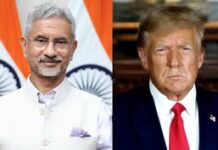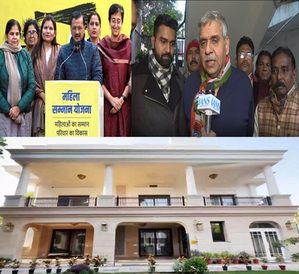New Delhi, Jan 12 (IANS) The unique campaign styles, political twists and controversies in the run-up to the February 5 Delhi Assembly elections have already made this keenly contested poll a memorable one.
The ruling AAP and the Opposition BJP and Congress are competing to create the right buzz, announcing attractive promises or jab rivals and raising questions over voter list revision.
As the campaign for the February 5 election enters the last lap, it is worth looking at the issues that the three players are highlighting to woo voters even as corruption, pollution, voter name deletion, free power, water and monetary and health schemes, jobs for bus marshals and youth, development in unauthorised colonies and pucca homes for slum dwellers dominate the discourse.
Sheesh Mahal
The award for the buzz word of Assembly election 2025 goes to “Sheesh Mahal”. The term was coined by the BJP to describe the renovated house of former Chief Minister Arvind Kejriwal and the corruption controversy surrounding it.
As “Sheesh Mahal” gained popularity in city’s political circles, the BJP referred to CAG findings suggesting that the renovation cost of the CM house was raised from Rs 8 crore to Rs 32 crore due to corruption.
BJP’s Parvesh Verma, who is challenging Arvind Kejriwal in New Delhi seat, caused a flutter by distributing Rs 1,100 cash to women as a financial assistance through his NGO — a move that pulled women voters but left the AAP calling it “Cash for vote”.
The ghost of liquor scam returned to haunt Kejriwal and the AAP government just before elections, with the CAG findings of a loss of Rs 2,026 crore to the exchequer forcing the AAP on the backfoot.
The AAP remained in denial yet the CAG report’s excerpts raised doubts about the party’s anti-corruption credentials. The AAP highlighted its clean image by publicising crowd-funding of campaign expenditure by leaders like Manish Sisodia and Atishi even as the BJP and the Congress highlighted the jail stays of Kejriwal and his ministers in money laundering cases..
To prove his point about corruption in Yamuna’s cleaning, Delhi BJP President Virendra Sachdeva took a dip in the polluted river and ended up with skin allergies. The BJP alleged a Rs 8,500 crore scam in the river cleaning project.
Electoral roll controversy
Despite the Chief Election Commissioner Rajiv Kumar’s assertion of no scope for manipulation in electoral rolls, the ruling AAP sustained pressure on the BJP by accusing the Opposition party of getting deleted the names of its voters from electoral rolls.
The name of AAP MP Sanjay Singh’s wife, Anita, was also removed as part of the summary revision that deletes names of absent, shifted and dead voters from lists.
Kejriwal even alleged that fake voters were added on the addresses of BJP MPs housed in New Delhi constituency. The former chief minister even complained to the ECI claiming that manipulation of electoral rolls and distribution of cash by BJP nominee Parvesh Verma may reduce the election to a “farce”.
The Delhi BJP countered by vowing to weed out Rohingya and Bangladeshi voters and accused the AAP of adding bogus voters to voter lists across the city.
Welfare scheme war
Kejriwal and CM Atishi launched Mahila Samman scheme which offered a stipend of Rs 2100 per month to unemployed women but the Delhi government’s women and child development (WCD) department advertised that the “Mahila Samman” scheme was “non-existent.”
Undeterred by the setback, Kejriwal went on to launch the Pujari and Granthi financial assistance scheme of Rs 18,000 monthly payout. This, too, could not be launched from Kejriwal’s New Delhi constituency due to objection by a section of Pujaris of Hanuman Mandir in Connaught Place.
Kejriwal’s Sanjeevani health insurance scheme offering free treatment in private hospitals to people over 60 years appeared to be a rival to BJP’s Ayushman Bharat PMJAY available in the rest of the country. However, AAP’s move to register beneficiaries for the Sanjeevani scheme also ran into controversy.
In a bid to counter the AAP’s freebie offerings, the BJP relied upon Prime Minister Narendra Modi’s guarantee — continuation of all ongoing free welfare schemes of the AAP government. Not only did the BJP assure free water, power and bus travel for women, but it went a step further by promising to boost family savings and earnings through rooftop solar power generation scheme.
At a rally in Delhi, PM Modi also gave a new term “AAP-da” (calamity) for the ruling party and launched the slogan of “Ab nahin sahenge, badal ke raheinge”.
PM Modi also distributed house keys to slum dwellers in Ashok Vihar in north Delhi, signaling to the poor that each resident of jhuggi jhopari in the city would get a pucca house and tap water supply under the BJP government. He also highlighted the free ration scheme and Pradhan Mantri Bhartiya Janaushadhi Pariyojana (PMBJP) affordable generic medicine outlets of the Central government.
While the AAP highlighted its Mohalla Clinic scheme, the BJP and the Congress circulated visuals of the defunct ones.
The Congress continued to showcase the good work done during its CM Sheila Dikshit’s tenure and matched rivals’ promises by offering Rs 2,500 monthly assistance for women, Rs 8,500 monthly aid for jobless youth and a Rs 25 lakh health insurance for all citizens.
The campaign so far has seen all three parties repeatedly making attempts to woo Purvanchalis, who constitute about 42 per cent of Delhi’s 1.55 crore voters and mostly live in unauthroised colonies plagued by poor civic amenities.
Reservation in Central government jobs and colleges for Jats — recognised as an OBC in Delhi — also became a flashpoint as AAP accused the Modi government of ignoring jats and the BJP reminded voters of the ill-treatment meted out by Kejriwal to Jat leader Kailash Gahlot — who quit AAP and joined the BJP.
The discontinuation of service of civil defence volunteers (CDVs) as bus marshals also generated heat with the ruling AAP blaming the BJP-controlled Raj Niwas for the CDVs’ difficulties.
Musical & ditigal warfare
Both the AAP and the BJP launched their election songs highlighting Kejriwal’s commitment to Delhiites and citizens’ pledge to bring in change, respectively. The competition between the popularity of ‘Phir laayenge Kejriwal’ and ‘Badal ke Rahenge’ is expected to continue till the close of campaign on February 3.
The campaign is also witnessing poster wars with an AAP poster targeting the BJP, which featured Ramesh Bidhuri, the BJP candidate from Kalkaji, and dubbed the BJP as “Gaali Galoch Party”.
The BJP, in turn, stepped up its digital campaign by unveiling a new poster labelling Kejriwal as “Sheesh Mahal wale AAPda-e-Azam.” Sharing it on X, Delhi BJP wrote, “Delhi ki Janta ne thaana hai, Sheesh Mahal wale AAPda-e-Azam ko hatana hai (Delhi’s public has vowed to remove Sheesh Mahal’s AAPda-e-Azam).”
Priyanka Gandhi figures in Kalkaji campaign
Desperate to mark its presence in the Delhi Assembly, the Congress workers on the ground have got a fresh reason to vent their anger over a recent remark by BJP candidate from Kalkaji Ramesh Bidhuri over Priyanka Gandhi.
Bidhuri promised to make the constituency’s roads “smooth like Priyanka Gandhi’s cheeks” and later withdrew the comment, claiming he did not intend to hurt anyone.
But the remark has angered the core Congress voterw, not only in Kalkaji but in many other constituencies, who may turn up to vote in a larger number than 2020. “We will teach BJP a lesson for bringing down the level of discourse,” said a voter at the CGHS dispensary near K-block in Kalkaji.
Bidhuri is pitted against Chief Minister Atishi and former MLA Alka Lamba of the Congress. The two-time MP’s personal attack on Atishi over her surname also kicked up a controversy.
Another development during the campaign which added to Congress confidence was New Delhi constituency candidate Sandeep Dikshit’s complaint to Lieutenant Governor V.K. Saxena against the AAP committing fraud by collecting sensitive details from women under the garb of non-existent financial assistance scheme.
Dikshit’s aggressive stance against alleged surveillance at his home by suspected Punjab Police cops also added to the Congress’ new-found self-belief.
Leader of the Opposition in Lok Sabha Rahul Gandhi making cold coffee at an upscale restaurant in Connaught Place and interacting with youth also captured eye-balls ahead of his proposed rally at Seelampur in east Delhi.
–IANS
rch/uk



























